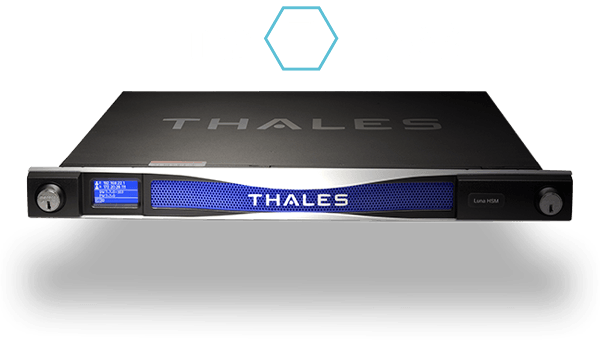TalkingTrust with Thales and Isara – Quantum Safe Crypto
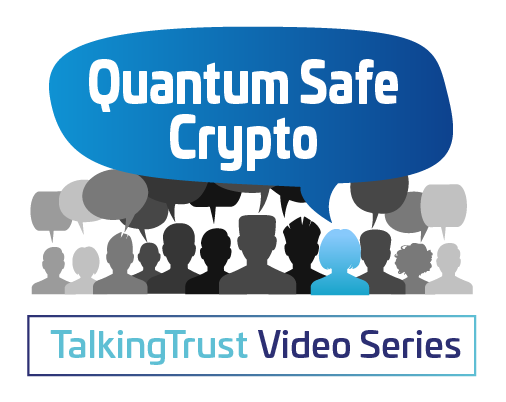 The Quantum era is quickly approaching, threatening to impact security, as we know it. But how will it really impact you and how can you prepare? In this TalkingTrust video you will learn about:
The Quantum era is quickly approaching, threatening to impact security, as we know it. But how will it really impact you and how can you prepare? In this TalkingTrust video you will learn about:
- The quantum landscape and where we’re at
- The quantum threat to use cases and industries and how it impacts internet security
- How crypto agility enables you to quickly react to cryptographic threats
- How to ensure your IoT devices can remain in use and secure from spoofed software updates
- Why it’s important to start preparing today with solutions that are readily available
- How Luna HSMs provide the foundation of trust for Isara's Quantum Safe Security solutions with its keys in hardware approach
Thales and Isara discuss the quantum landscape and where we’re at, the quantum threat impacting internet security, how crypto agility enables you to quickly react to cryptographic threats, securing your IoT devices from spoofed software updates, and preparing today with solutions that are readily available.
Speakers:
David Madden, Director of Business Development at Thales
Angelo Fasulo, VP Executive: Sales & Marketing, Channel, Technology Partnerships, Operations, B2B & B2C, Isara
Thales Technology Partner: cpl.thalesgroup.com/partners/isara-corporation
Partner website: www.isara.com

Resources:
Video Transcript
TalkingTrust Series – Thales and Isara – Quantum Safe Crypto
00:10 Hello everyone.
00:11 We're here today to talk about quantum
00:13 crypto,
00:14 what is available and where the market
00:17 is, and we're glad to have
00:18 here today my colleague Angelo Fasulo,
00:22 Director of
00:23 Strategic Partnerships with our
00:25 quantum partner Isara,
00:27 who's one of the leading experts in
00:29 the quantum crypto industry,
00:31 and he's here today to help us
00:33 understand this a critical
00:35 and emerging market. So let's get started
00:37 with the short history
00:39 and background of quantum, including some
00:41 of the challenges of adjusting
00:42 organizations
00:44 who are dealing with innovation, cloud
00:46 IoT, and digital transformation,
00:48 and some of these impacts, so to start
00:49 with a little history.
00:51 Sure, that sounds good Dave. Thanks for
00:54 having us. Isara is
00:56 very happy to be a partner of Thales
00:59 and join you and the client base
01:02 on the journey
01:03 to quantum safe, and we thought
01:05 we'd start off with a few
01:07 slides to kick off the discussion, so
01:09 I'll
01:12 start here. So just generally
01:13 speaking, there is a ton
01:16 of good great content
01:19 available on quantum
01:22 computing,
01:24 how quantum computing is going to sort
01:27 of
01:27 revolutionize the compute industry, and
01:30 the different things that quantum
01:31 computing
01:33 is going to be able to do that a
01:35 traditional computer
01:37 can't do. I'm by no means an expert in
01:40 the field. I'm on the
01:41 business side, but at a high level
01:43 so everybody understands,
01:46 quantum computers will be able to
01:49 solve problems that traditional
01:50 computers
01:52 don't solve, and today there are a number
01:55 of
01:55 nations, virtually all of big tech,
01:59 that are investing very heavily in
02:03 making sure that this materializes and
02:05 that this happens. With
02:06 right now moving from theoretical
02:09 to practical, and then you know there's
02:12 the next challenge which is going to be
02:14 moving from
02:15 practical to actual commercial use cases.
02:18 But there will be a time it isn't a
02:19 matter of if it is, more of
02:21 a matter of when.
02:22 When companies will be
02:25 able to
02:25 get shared quantum computing
02:28 services
02:29 in the cloud, and use those services
02:32 to improve things like drug design,
02:33 machine learning,
02:36 big data optimization for financial
02:40 modeling, optimization for traffic
02:42 modeling, all sorts of really cool
02:45 and exciting stuff. Now one thing
02:48 as well, and it's kind of why we're here
02:50 today and why
02:51 Isara and Thales is partnering,
02:54 is one of the big problems that quantum
02:56 computers will be able to solve.
02:58 Factoring is complex math and
03:02 as all of you know complex math is
03:04 behind
03:05 the algorithms that are used to
03:08 protect
03:09 pretty much all layers of our
03:12 technology infrastructure. Crypto is
03:16 pretty much everywhere in the technology
03:18 stack
03:19 and that crypto, specifically
03:22 asymmetric crypto, is a
03:24 threat. Using something called Shores
03:26 Algorithm,
03:27 with the right quantum computing
03:29 computer, in the wrong hands -
03:33 you know it's very important that
03:35 customers
03:36 start to, and when I say customers, I mean
03:39 customers of ours, customers of Thales,
03:41 we mean anyone from an
03:43 enterprise
03:45 to government should really start to
03:48 prepare
03:49 for migrating their cryptography so that
03:52 it's
03:52 quantum safe, and Angelo, to your
03:55 point, you know we're really looking at
03:56 digital transformation here. I mean
03:58 at the end of the day, everybody's moving
04:00 to a digitally transformed business.
04:02 So in effect when we talk about
04:04 customers, we're literally talking anyone
04:06 that's going to be here
04:07 10 years from now. They've got
04:09 to start worrying about this today,
04:11 and one thing,
04:14 one of the things,
04:14 I think we've all seen 20
04:16 years ago was
04:18 Y2K was a big issue. People
04:22 had to move from old systems to new ones
04:24 and it sounds like
04:25 with quantum we're seeing something
04:27 similar. Can you describe this in a little
04:28 more detail?
04:29 Yeah, and you know there's a common
04:31 term in the quantum industry Y2Q.
04:33 The difference between Y2K and Y2Q is
04:36 with Y2K we knew when it was going to happen
04:38 but we don't know when it’s going to
04:39 happen for Y2Q.
04:41 It's the opposite. We know what's
04:43 going to happen, we just don't know
04:45 when.
04:45 It is actually going to happen so what
04:48 we advise
04:49 most organizations now
04:52 is to focus on crypto agility, which
04:55 essentially means
04:57 getting themselves ready, and that's
05:00 different
05:00 depending upon the type of organization
05:02 that you're in.
05:03 For example, if you are an organization
05:06 that builds
05:06 long life devices, satellites,
05:09 infrastructure,
05:11 cars, anything that has to be in the
05:14 field for a long period of time,
05:16 those solutions that you are shipping
05:19 out now
05:20 need to be quantum safe essentially now
05:23 because you know they're going to be in
05:24 life
05:25 for the next 10 or 15 years, and that
05:27 they will be susceptible to a threat
05:30 during that time. So we're encouraging
05:33 you know a lot of the preparation to
05:35 begin through
05:36 POCs for those companies to understand
05:39 the algorithms, understand how they will
05:41 perform
05:42 in their chips, in their memory, in their
05:44 communication,
05:45 in their sensors, so that their next
05:48 product life cycle will have
05:50 quantum safe algorithms embedded. That's
05:52 one place, and the other
05:53 place is
05:54 for large enterprise, financial
05:56 institutions,
05:58 governments, anybody with a very complex
05:59 PKI. I think we all know that it's
06:02 extremely
06:02 difficult and complex to migrate and
06:06 to
06:06 upgrade cryptography across the board, so
06:09 starting now and putting together those
06:11 plans
06:12 is a really critical, important
06:14 element
06:15 to the whole piece of the puzzle.
06:17 Right, and I guess like Y2K, to your point
06:20 people didn't really think
06:22 about that when they started building
06:23 computer systems, but today
06:25 we can start planning as you say for
06:27 crypto agility and quantum
06:29 now. Get it right, and by the way, as you
06:31 say in this slide,
06:32 people have to start worrying about this
06:34 stuff today to get it right.
06:36 You know, 10, 20 years from now when we
06:38 know
06:39 that those Shores Algorithms can be
06:41 broken, so how are we approaching this
06:43 from
06:44 a more specific view Angelo. Can we
06:46 describe in a little more detail
06:48 how we're approaching these customers?
06:51 One thing that we often get
06:54 asked about quite a lot is when
06:57 will,
06:59 how do you know what is going to be safe,
07:00 what are the right algorithms
07:02 to use, et cetera. Right now NIST is going
07:05 through a very detailed
07:06 process, a selection process. Isara
07:09 as an example that follows that process very
07:11 closely.
07:13 NIST will sort of lay the foundation
07:17 of what are the right algorithms
07:19 to be used and for the right, different use
07:21 cases,
07:23 so it's a matter for companies to do a
07:25 few different things.
07:26 Understand their infrastructure, follow
07:29 the process
07:30 that NIST has worked with vendors who are
07:33 also following
07:34 that same process so that when the time
07:36 is right,
07:37 they can move from early
07:40 evaluation,
07:41 to POC, to production. So
07:44 Isara at its core has a
07:47 quantum-safe toolkit. That quantum safe
07:50 toolkit basically allows developers to
07:53 take those algorithms and easily
07:55 implement those in their environment you
07:58 know. One of the partnerships that we
07:59 have, one of our
08:00 strongest partnerships, is with Thales,
08:02 and that's why we're here today
08:04 with Dave.
08:05 Thales has taken that tool kit and
08:08 embedded it
08:08 into it's Luna HSM, and
08:11 a customer can then take that HSM
08:15 and start to use the algorithms in a
08:18 number of different
08:19 use cases. That's what we're
08:23 encouraging clients to do, look at things
08:25 like
08:26 code signing, document signing,
08:29 certificates,
08:30 smart cards, and look at ways to start to
08:34 prepare to make those
08:36 elements of their of their
08:38 infrastructure
08:39 quantum safe. That's what
08:41 Thales and Isara
08:43 work together on.
08:46 One of the things I think is
08:47 interesting as we talk about crypto
08:49 agility is
08:50 people are probably familiar with a
08:51 hardware security module being either a
08:52 physical device
08:54 that's stored on-premises safely or run
08:57 in the cloud,
08:58 and as you say, well if we've got crypto
09:00 agility what happens if
09:02 different crypto algorithms become
09:04 ratified by NIST. How do we evolve
09:06 those change over time?
09:08One of the things that Isara and
09:09 Thales have done is have what's called a
09:11 functionality update to the HSM, to
09:13 support those different
09:15 algorithms for quantum safe
09:18 algorithms
09:18 over time as part of the Isara toolkit,
09:21 and then leverage those as we say into
09:23 these different
09:24 partners like DigiCert for code
09:26 signing, document signing,
09:28 public infrastructure, so you can issue
09:30 quantum safe keys
09:32 today and use them down the road as well.
09:35 So let me ask this though.
09:36 i'm sure what’s going through a lot of people's
09:37 minds is what about NIST
09:40 and this certification process? i'm
09:41 hearing there's a number of candidates.
09:44 Angelo, can you describe in a little more
09:45 detail how that's going. Who might win
09:48 and how do customers think about this.
09:50 That's a good question, and I think
09:53 we all have to keep in mind
09:54 that it is
09:56 going to be a continually evolving
09:59 process.
10:00 We're all going to learn what
10:03 algorithms are,
10:04 the best algorithms for the best use
10:06 cases, and then we'll all
10:08 efficiently use those algorithms in the
10:10 best way and process
10:11 possible, and NIST is the
10:13 leader to
10:16 put those standards together for
10:18 us so then we can follow suit. So what I
10:20 mean, what Isara
10:22 does, this is a good
10:24 slide that covers it.
10:26 We take the NIST candidates,
10:29 and NIST has gone through this selection
10:30 process.
10:31 The selection is getting
10:33 narrower and narrower
10:35 than even within the algorithms,
10:38 things will
10:39 change so we have extensive
10:42 researchers who
10:43 follow that process, look at the
10:47 algorithms, figure out the best way to
10:50 optimize it, and then basically
10:53 put it in a in a kit so that developers
10:56 don't have to do all of that work.
10:58 They can make it easy for
11:00 developers to then go and use those
11:01 algorithms for the products that they're
11:03 trying to
11:04 bring to market. So
11:07 with a Thales functionality module on an
11:10 HSM, and
11:10 the Isara toolkit, what you're
11:12 getting is ongoing
11:15 support and an ongoing
11:18 commitment to the evolution of our
11:20 products
11:21 as the NIST process gets finalized.
11:25 And even after finalization as it
11:27 changes,
11:28 we can ensure that our toolkit
11:30 will always have those latest and
11:32 greatest changes
11:33 and make it easy for customers to evolve
11:35 their products.
11:36 The best thing to do though
11:38 right now is to start,
11:40 is to take certain algorithms,
11:44 work with parties like us or open source
11:48 or a bit of both,
11:49 and to start to test, to start to
11:51 understand how they perform
11:53 within your environment, within your
11:55 product, so you
11:56 get the familiarization and you can more
11:58 easily and more confidently put a
12:00 plan in place to go to
12:03 market. A good
12:04 example of that is probably
12:07 right here with actually
12:08 code signing. We probably find
12:12 code signing to be the most
12:13 common use case today.
12:16 If you take anyone who has a
12:19 long life
12:20 device, if you are in the infrastructure
12:23 business
12:24 and you have things that are going to be
12:27 in the field for
12:28 10, 15 years, you know that they are going
12:31 to be susceptible
12:32 to a looming threat, and you would want
12:35 to take something like
12:37 our toolkit and start to
12:40 embed those algorithms into the
12:43 different elements of your
12:45 overall
12:45 code signing solution. Right, so we work
12:48 with
12:49 Thales so that your Luna HSM can be enabled
12:52 with
12:53 those algorithms. You might have a code
12:56 signing service,
12:57 internal or external, you would want to
13:00 make sure that that service
13:02 is enabled with the algorithms. If you're
13:06 at the point where that service
13:07 eventually will be
13:09 a certificate authority like a DigiCert
13:12 for example,
13:13 or your internal certificate
13:17 services, you want to make sure that they
13:19 understand
13:20 the algorithms and then finally you know
13:22 the verification of those algorithms on
13:24 the actual end
13:25 device itself. So we look at this
13:28 as
13:28 the four different components in
13:31 the total solution that you would want
13:33 to make quantum safe,
13:35 and what Dave and I have both found
13:38 because we've been now
13:39 talking to a lot of enterprises over
13:41 the last year or two,
13:42 typically where one would start
13:44 is with the HSM
13:47 and getting an HSM into some sort of
13:49 POC environment
13:51 to host the algorithms and to start
13:54 the process off.
13:56 That's a great example Angelo, and
13:58 as a lot of people are aware
14:00 code signing’s been around for a
14:01 couple of decades now.
14:03 Organizations are improving their
14:05 processes to make them more
14:06 robust if you will, and you know
14:08 there's been a number of
14:10 very high profile issues around the code
14:13 sign process of whether it's
14:14 authentication to that process,
14:16 securing the keys without process. But
14:19 as they say, there's been a lot of issues
14:21 and this is one of the use cases that's
14:23 you know as
14:24 companies become more digitally focused on
14:26 services software,
14:28 cloud native containers, they have to
14:31 worry about
14:32 protecting those digital assets in a
14:34 very secure way. And
14:35 you know, code signing has been around
14:37 for a long time, and with Isara what
14:39 we're trying to do is
14:40 ensure that not only with today's crypto
14:42 they can secure their
14:44 digital assets, they can also do this in
14:46 a secure way
14:47 in a crypto agile world with quantum, and
14:51 this is really part of our
14:52 whole Modern HSM and modern story at
14:55 Thales as
14:56 we help our critical customers on
14:58 their path to digital transformation.
15:00 So let's take a closer
15:03 look now at
15:05 at one question that I think a lot of
15:06 people have. Angelo, I know
15:08 you don't control this process,
15:10 but as you say Isara and your team are
15:12 very
15:13 close to the team, but if you had to
15:14 guess, is there a high-level time frame
15:16 that you anticipate NIST finalizing
15:19 some of these details for us
15:21 around this. Is it a year out, is it two
15:23 years out?
15:24 Yes, NIST is this is already making tons
15:27 of
15:28 progress right now. They've issued a
15:30 stateful, or a special publication
15:32 on stateful hash-based algorithms.
15:35 Stateful hash-based algorithms are
15:37 really good for
15:39 code signing, so
15:42 the process evolves but
15:45 you'll see updates in between 2022 and
15:49 2024, and you can expect a lot of
15:52 finalization to occur within that period.
15:55 I think it could happen
15:58 in
15:58 pieces versus all at once, but the
16:01 good news is that progress
16:03 is there and what we're
16:06 kind of encouraging that
16:09 you look at that process between
16:11 now and 2026. You really should have
16:13 everything
16:14 ready and underway and being able to
16:17 execute,
16:18 because thereafter, five or ten
16:21 years after that,
16:22 the threats could really
16:25 be more than just
16:26 the conversation that we're having
16:27 right now and we can start to see some
16:30 some real examples. So it's best to be
16:32 prepared.
16:33 Great and to your point, the first
16:35 link that we're going to share with you
16:36 is our
16:37 Crypto Agility Risk Assessment tool, and
16:39 this was designed for CISOs to
16:42 to be able to run through an
16:44 assessment in 10 minutes online,
16:46 and calculate their organization's risk
16:48 profile. Someone
16:49 building cars or planes
16:52 or trains may have a longer
16:54 assessment than someone building
16:55 software services, but
16:57 in either case it's vital now to take an
17:00 assessment. And then of course the second
17:02 phase is
17:02 to try this out as a POC with
17:05 the Isara toolkit
17:06 that one can use with our Thales Luna
17:08 HSMs running the
17:10 the quantum safe crypto. Plug that into
17:13 third-party applications like a
17:15 DigiCert PKI
17:16 to create applications like code signing and
17:18 have quantum crypto safe
17:21 code signing solutions. So thanks
17:23 again for joining us today on this talk
17:25 Angelo.
17:26 As I say, Isara is a critical partner of
17:28 Thales as we
17:29 we move to this agile crypto world,
17:32 and we're going to be building solutions
17:34 now and for the next
17:36 decade to help secure companies as they
17:38 transform their businesses digitally.
17:40 This has been part of our Modern HSM
17:42 campaign and hope you've enjoyed this. As
17:44 I said, there's lots more information
17:46 we can share with you if you click on
17:47 those links, and please feel free reach out if
17:49 you have questions or ideas.
17:51 I want to thank Angelo for joining
17:53 us today and hope
17:54 this webinar was useful. Thanks for
17:57 having us Dave.
17:57 Take care. Take care everybody.

Post-Quantum Crypto Agility Risk Assessment Tool
Are you post-quantum ready? In just 5 minutes you will gain a better understanding of your organization’s post-quantum breach risk.
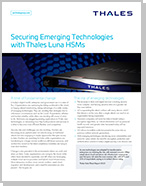
Securing Emerging Technologies with Thales Luna HSMs - Solution Brief
In today's digital world, enterprise and government are in a state of flux. Organizations are optimizing by taking workloads to the cloud, or forging ahead transforming, taking advantage of a wide variety of emerging technologies. They are revisiting their strategies due to...
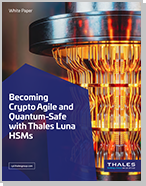
Becoming Crypto Agile and Quantum-Safe with Thales Luna HSMs - White Paper
This white paper will focus on the use of Thales Luna Hardware Security Modules to enable the most seamless, trustworthy and cost-effective method of transitioning to quantum-safe security with a crypto agile solution.The challenges and solutions outlined within will show how...
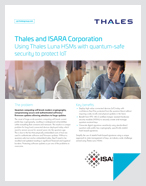
Thales and ISARA Corporation - Solution Brief
The onset of large-scale quantum computing will break current public-key cryptography, resulting in widespread vulnerabilities within everything that connects and transacts. This results in a unique problem for long-lived connected devices deployed today which need to remain...
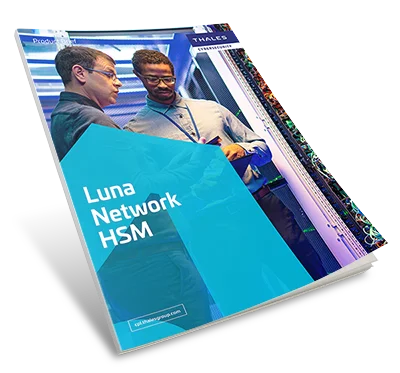
Luna Network HSM - Product Brief
Secure your sensitive data and critical applications by storing, protecting and managing your cryptographic keys in Thales Luna Network Hardware Security Modules (HSMs) - high-assurance, tamper-resistant, network-attached appliances offering market-leading performance and...
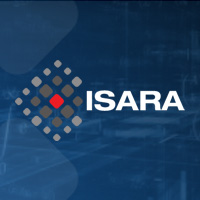
ISARA Radiate Quantum-Safe Toolkit
The ISARA Radiate Quantum Safe Toolkit includes a high-performance, standards-based quantum-safe cryptographic library and integration tools built for developers.
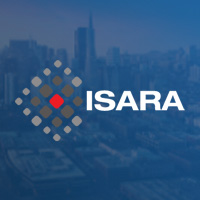
Guide: Managing Crypto and Quantum Risk
A non-technical and hype-free explanation of what’s at risk, what you can do, and why you should act now.

